Caroline Leavitt's Blog, page 87
July 4, 2013
Read the first chapter of Lionel Shriver's extraordinary new novel Big Brother
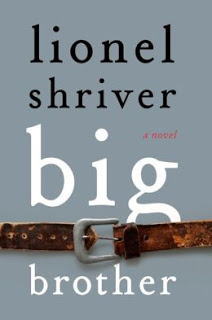
Lionel Shriver is one of my favorite writers. Smart, provocative, unsettling. what better adjectives could you ask for than that? I'm thrilled to have an excerpt of her new novel here. And if you missed it, here is a repost of my interview with you.
Chapter One
I have to wonder whether any of the true highlights of my fortysome years have had to do with food. I don’t mean celebratory dinners, good fellowship; I mean salivation, mastication, and peristalsis. Oddly, for something I do every day, I can’t remember many meals in detail, while it is far easier for me to call up favorite movies, faithful friendships, graduations. It follows, then, that film, affinity, and education are more important to me than stuffing my face. Well done, me, you say. But were I honestly to total the time I have lavished on menu planning, grocery shopping, prep and cooking, table setting, and kitchen cleanup for meal upon meal, food, one way or another, has dwarfed my fondness for Places in the Heart to an incidental footnote; ditto my fondness for any human being, even those whom I profess to love. I have spent less time thinking about my husband than thinking about lunch. Throw in the time I have also spent ruing indulgence in lemon meringue pies, vowing to skip breakfast tomorrow, and opening the refrigerator/stopping myself from dispatching the leftover pumpkin custard/then shutting it firmly again, and I seem to have concerned myself with little else but food.So why, if, by inference, eating has been so embarrassingly central for me, can I not remember an eidetic sequence of stellar meals?Like most people, I recall childhood favorites most vividly, and like most kids I liked plain things: toast, baking-powder biscuits, saltines. My palate broadened in adulthood, but my character did not. I am white rice. I have always existed to set off more exciting fare. I was a foil as a girl. I am a foil now.I doubt this mitigates my discomfiture much, but I have some small excuse for having overemphasized the mechanical matter of sustenance. For eleven years, I ran a catering business. You would think, then, that I could at least recall individual victories at Breadbasket, Inc. Well, not exactly. Aside from academics at the university, who are more adventurous, Iowans are conservative eaters, and I can certainly summon a monotonous assembly line of carrot cake, lasagna, and sour-cream cornbread. But the only dishes that I recollect in high relief are the disasters—the Indian rosewater pudding thickened with rice flour that turned into a stringy, viscous vat suitable for affixing wallpaper. The rest—the salmon steaks rolled around somethingorother, the stir-fries of thisandthat with an accent of whathaveyou—it’s all a blur.Patience; I am rounding on something. I propose: food is by nature elusive. More concept than substance, food is the idea of satisfaction, far more powerful than satisfaction itself, which is why diet can exert the sway of religion or political zealotry. Not irresistible tastiness but the very failure of food to reward is what drives us to eat more of it. The most sumptuous experience of ingestion is in-between: remembering the last bite and looking forward to the next one. The actual eating part almost doesn’t happen. This near-total inability to deliver is what makes the pleasures of the table so tantalizing, and also so dangerous.Petty? I’m not so sure. We are animals; far more than the ancillary matter of sex, the drive to eat motivates nearly all of human endeavor. Having conspicuously triumphed in the competition for resources, the fleshiest among us are therefore towering biological success stories. But ask any herd of overpopulating deer: nature punishes success. Our instinctive saving for a rainy day, our burying of acorns in the safest and most private of hiding places for the long winter, however prudent in its way, however expressive of Darwinian guile, is killing my country. That is why I cast doubt on whether the pantry, as a subject, is paltry. True, I sometimes wonder just how much I care about my country. But I care about my brother.
Published on July 04, 2013 07:54
July 3, 2013
Preview of things to come on the blog
One of my favorite parts of the movies (I'm a movieholic) is the preview of coming attractions. So here are some for the blog:
An excerpt of Lionel Shriver's amazing BIG BROTHER
An interview with Joyce Maynard
An interview with Michael Medeiros about his upcoming, smart, funny and very subversive new film TIGER LILY ROAD
A Q and A with Melissa Studdard and Donna Baier Stein about The Tiferet Talk Interviews (which included talks with Julia Cameron, Floyd Skloot, Robert Pinsky, and so much more
An excerpt of Lionel Shriver's amazing BIG BROTHER
An interview with Joyce Maynard
An interview with Michael Medeiros about his upcoming, smart, funny and very subversive new film TIGER LILY ROAD
A Q and A with Melissa Studdard and Donna Baier Stein about The Tiferet Talk Interviews (which included talks with Julia Cameron, Floyd Skloot, Robert Pinsky, and so much more
Published on July 03, 2013 08:55
Let's hear it for debuts part three: Andrea Lochen talks about The Repeat Year and so much more
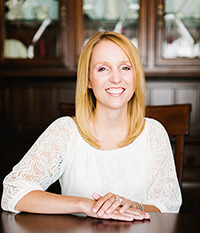
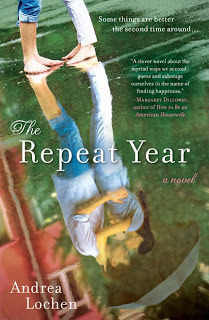
I love debuts. So I'm happy to host Andrea Lochen today and her novel, The Repeat Year. Andrea Lochen earned her Master of Fine Arts in Creative Writing from the University of Michigan. While there, she won a Hopwood Novel Award for a draft of The Repeat Year. She currently lives in suburban Milwaukee with her husband and teaches Creative Writing at the University of Wisconsin-Waukesha. The Repeat Year is her first novel. Thank you so much for being here, Andrea.
What sparked the writing of this book? How do you know what you know about the subject and why were you compelled to write about it?I wrote a draft of The Repeat Year when I was an MFA student at the University of Michigan, a time in my life when every decision I made seemed long-reaching, momentous, and capable of permanently altering the course of my life: education, marriage, a career, where to live, etc. In that mindset, I wrote the character of Olive, a young woman who wakes up on New Year’s Day to discover she is reliving the previous year, a year in which she made terrible mistakes and now has the opportunity to rewrite. Because I think the question of “what might have been” is compelling to people at all stages in their life, I also created the character of Sherry Witan, a middle-aged woman who has accumulated even more regrets than Olive, to be a kind of mentor for her. I’ve always been fascinated by the ideas of fate, freewill, and chance, and how people make sense of their lives based on which concept or combination of concepts they believe in. It was a lot of fun to put Olive, a person who firmly believes in the power of her own freewill, in a situation where she feels like fate and the universe are conspiring against her, and see what would happen.
What kind of writer are you? Do you outline or just "follow your pen?" What's your writing life like?I’m a somewhat manic writer—euphoric when things are going well, despairing when I hit the slightest obstacle. Because I teach college writing nine months out of the year, I have to be very industrious when I do have time off to write, so I throw myself into it and hardly come up for air for weeks at a time. Though I don’t outline, I do jot down character notes and key plot points, and I always have the shape of the novel (the beginning, climax, and ending) in mind. I usually allow the characters to tell me how I’m going to get there!
What surprised you in writing this particular book? This was my first novel, so I was completely unprepared for how much the book would transform over the course of my writing it—the first draft is so very different from the finished book! Like most young writers, I had no conception of how much time, energy, and revision actually go into the novel-writing process. It gives me renewed admiration and respect for all my favorite authors knowing that they didn’t sit down and churn out gold overnight, but that they had to really labor over their craft. What strange, wonderful creatures writers are!
What's obsessing you now and why?Lately I’ve been obsessed with the gender-biased ways books are marketed. Maureen Johnson wrote a great article called “The Gender Coverup” in The Huffington Post that talks about how women’s books tend to get a fluffier treatment and therefore are taken less seriously, and it really struck a chord with me. Since then, I’ve become more and more aware of how men’s and women’s novels are marketed differently—everything from the cover design to the blurbs to even the way we talk about books—and it really bothers me, but unfortunately I can’t say that I have a solution. I think awareness that a problem exists is a good start though.
What question didn't I ask that I should have?Perhaps, “What’s next for you?” After the whirlwind of my book launch and my end of the semester grading, I am really looking forward to two things: 1) doing some serious summer reading (on my list are Amy Sue Nathan’s The Glass Wives, Marci Nault’s The Lake House, Kristiana Kahakauwila’s This is Paradise, Ben Stroud’s Byzantium, and of course, your new one Is This Tomorrow) and 2) revising my new book. Like The Repeat Year, my second novel also has a magical premise. It’s about a young single mother who discovers one summer she can see her four-year-old son’s imaginary friends, and it’s been such a pleasure to write!
Published on July 03, 2013 08:41
Let's hear it for debuts, part two: L. Alison Heller talks about The Love Wars, being a lawyer and a writer, and so much more
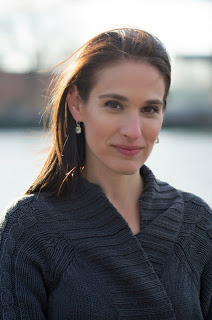

The Love Wars by L. Alison Heller is a sparkling debut you'll want to tuck into your beach bag, along with your sunblock. Thank you so much, Ms. Heller, for coming on my blog.
What sparked the writing of this book? How do you know what you know about the subject and why were you compelled to write about it?
Like Molly, the main character in The Love Wars, I switched to divorce law from a more commercial field because I was in search of a connection to actual, human clients. I explained this while interviewing at the firm where I eventually worked and one of the lawyers warned, “be careful what you wish for!”
It was a fair point. Divorce work certainly involves a human connection—but at times to an overwhelming degree. It’s alternatively tragic, ridiculous, frightening and uplifting. My colleagues had a mantra: someone oughta write a book. (They had a lot of mantras; another was you can’t make this stuff up, which I apparently took much less to heart than the oughta write a book one.) I’ve always loved to write and the idea of writing fiction set in the world of New York divorce law stuck. After I’d stopped litigating for long enough for my memories to gel a bit, I sat down to do it.
What kind of writer are you? Do you outline or just "follow your pen?"
I do both. I start with a very rough outline that I change along the way because a fair amount of my plotting happens as I draft. Basically, it’s a lot of fits and starts until I get to the part where I feel like I’m living and dreaming the story, at which point things flows easier. Would that I had a magic pill to get me to there . . . but alas, I must sweat and experience false starts and periodic freak outs that there’s only 100 pages worth of story in the idea that seemed so terrific not too long before.
What surprised you in writing this particular book?
From a process standpoint, how much joy it gave me. Writing requires work, for sure—keeping your butt in chair for hours, thinking to the point of brain-freeze, the fits and starts described above—but somehow it’s still refreshing.
From an industry standpoint, everything was a surprise. I’m set in my ways as a lawyer and have my little systems down, but publishing was all new to me: The editing process! The pitching and publicity! The waiting (oh, the waiting)! I’m sure, however, I’ll be much savvier when my second novel comes out next June—because that’s how it always works, right? (Right?!?)
What's your writing life like?
If I could, I’d write from early morning to mid-afternoon, but I can’t always claim those prime hours. So, I write whenever I can. My work-in-progress perpetually jiggles in the back of my mind though.
What's obsessing you now and why?
Obsessing is a default mode for me and I could give at least five honest answers here. So as not to scare, I’ll stick to one: the structure of my third book, with which I keep experimenting.
What question didn't I ask that I should have?
Because I always enjoy hearing other peoples’ reading lists, I’ll share the last book I finished: WONDER by R.J. Palacio. It’s summer reading for one of my nephews and was literally lying in a chair at his house. I picked it up casually—so I wouldn’t end up sitting on it—and ended up glancing at the cover, which is a soothing shade of blue and has on it an intriguing drawing. I wound up not putting the book down until the next day because it was so emotionally riveting, with such a wonderfully moving message about kindness and inclusion.
Published on July 03, 2013 08:34
Let's hear it for debuts: Sara Divello talks about Where in the Om Am I?
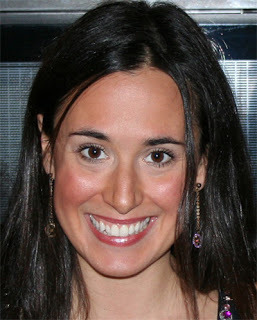
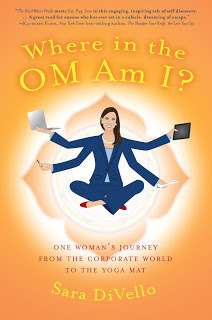
Those of you who know me, know that yoga makes my teeth itch. However, that doesn't mean that I don't love reading about it, especially when the book is as fresh, funny, and smart as Sara Divello's Where In the Om Am I? Don't just take my word for it. The notoriously cranky Kirkus Reviews says the book is "A must-read for yogis (or would-be yogis) who enjoy a little snarkiness with their savasana.” Thank you Sara, for not making me do a headstand or yoga breathing, for writing such a hilarious book, and for coming on my blog! What sparked the writing of this book? How do you know what you know about the subject and why were you compelled to write about it?I always knew I wanted to write—but I just assumed, without even thinking about it, that I would write fiction. Then, at some indiscernible point, I realized I had a lot of so-crazy-they-have-to-be-true stories and I really wanted to share them. That’s how “OM” came to be—it’s about my transition from financial services to yoga, and all of the outlandish things that actually happened (and people I met!) in both worlds along the way. The bottom line (as they say in financial services) is that I love storytelling—I love hearing stories, telling stories, and laughing so hard I cry.
I was also really excited to write about some of the more-serious themes in “OM” that have been kicking around in my head for years—topics that I’m really interested in, that I want to talk about. Specifically, the way that women interact with each other—especially in the workplace—fascinates me. I was excited to explore that in the book. I was also really interested in writing about the concept of feeling “stuck” in a career that feels stifling and wrong, and then going through the process of trying to find something that feels liberating and right. It’s hard, scary work to think about what you really want to do with your life—with your one glorious, adventurous, brave life. And it’s especially scary to think about leaving the familiarity of what you know and are good at. It seems like we modern folks are so busy, it’s hard to find time to get to the dry cleaner, let alone ponder deep stuff like what to do with the rest of your life. The danger is that if you don’t take the time to dig in to that work, a decade—or several—can slip by and then you can feel even more stuck and anxious and frustrated.What kind of writer are you? Do you outline or just "follow your pen?"I followed my pen for “OM”—to my own detriment. In hindsight, I realize I could’ve saved myself a lot of time and frustration by outlining. I aspire to be a planner for my next book.What surprised you in writing this particular book?I was surprised at the parallelisms that I found between the corporate and yoga worlds when I really went back and looked. I initially thought these worlds and the people who populate them could not be more different. I mean, major financial companies and yoga? Really? I thought the story would be in the contrast! But as I went back over my draft and edited it approximately 5,887,992 times, I started to see that as different as finance and yoga are—most prominently exemplified by wardrobe and personal commitment to deodorant and shaving—there were also surprising similarities like a fondness for using industry buzz words, flawed leadership, and unfortunate tendencies toward pretentiousness and ego.I was also surprised by how neatly things tied up—this is real life and real people after all! But apparently, a career transition from the fast-paced, cutthroat corporate world to the unexpectedly catty, sometimes perilous yoga realm can work out…once you get over some shockingly unexpected hurdles. Fortunately, in my transition to writing, I have not had to grapple with anyone’s craziness other than my own!What's your writing life like?In a word: evolving. I’m new to this world. Truthfully, I got to this question and thought, “I have a writing life?” because it’s still weird for me to think of myself as a “writer.” I’m feeling my way slowly along, learning a LOT as I go, and am utterly, utterly delighted to be here. It took me awhile to gather the chutzpah to go after what I wanted, but I’m so grateful that I did.What's obsessing you now and why?Summer. I love summer! Living in Boston, summers are far too fleeting (at least compared to the unrelenting winters), so I’m trying to revel in the season and really soak it in. I’m an urban gardener and right now I have crops of kale that are almost up to my waist out on the porch. I throw a few leaves into my smoothies in the morning with some almond butter, Greek yogurt, and whatever fresh, organic fruit I have on hand. I also incorporate kale and whatever other greens I have growing into whatever I cook for dinner every night. In a few weeks, the basil will be full-grown and I’ll start making copious amounts of pesto. After reading Barbara Kingsolver’s Animal, Vegetable, Miracle I started freezing it and then using it over the winter. Last year I froze about 12 pounds and I can tell you—there is nothing better than bright, vibrant green pesto in January!What authors have influenced you?I think every book—from some of the first I read (such as The Secret Garden, Anne of Green Gables, and Gone with the Wind) to every book I read now—has taught me something, whether it’s imagery, dialogue, world-building, or maybe something I’m not even consciously aware of. At some point in the Anne of Green Gables series, Anne’s teacher tells her to use small words—they’re stronger. It’s been decades since I first read that, but I still try to incorporate it into my own writing.
I first expanded into memoirs in 2005 with The Glass Castle by Jeanette Walls. I loved how honest and raw and brave that book was. After that, memoirs quickly became a substantial part of my reading diet. Jenna McCarthy’s If It Was Easy, They’d Call the Whole Damn Thing a Honeymoon (and Jenna in general) is a great example of laugh-so-hard-it-hurts humor. Kathleen Flinn’s The Sharper Your Knife, the Less You Cry is a great example of an inspirational story of one woman changing her life with a totally brave, unexpected leap. I loved how she could switch from these lyrical descriptions of Paris to the humility of getting yelled at in French (which she barely spoke) by a chef-teacher in front of a whole class. Poser by Claire Dederer is an example of artisanal writing…and the ability to tell the story of an “ordinary” life in a way that is relatable and compelling. I still love fiction—and I’ll always read it. But I am fascinated by the true stories of other people’s lives. Maybe it’s a little voyeuristic, but I always learn so much, and I’m also comforted and inspired by reading how others have struggled and evolved.
Published on July 03, 2013 08:28
June 28, 2013
Kate Christensen talks about Blue Plate Special: An Autobiography of My Appetites, how being happy has changed her writing, why you can't tell the whole truth, and so much more
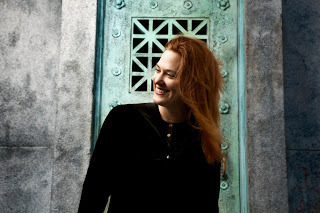
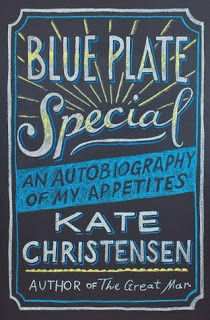
There are certain writers that other writers just adore. Not just for the writing said writer produces, but because of the heart, the humanity, the humor, the wonderfulness of the person. Yep. I'm talking about Kate Christensen. She's the acclaimed author of six novels, including THE EPICURE'S LAMENT, the PEN/Faulkner award-winning THE GREAT MAN, THE ASTRAL and her newest, BLUE PLATE SPECIAL: AN AUTOBIOGRAPHY OF MY APPETITES, a wonderful memoir about food, fate, finding family and love, and writing. I can't tell you how thrilled and jazzed and honored I am to have Kate here. Thank you, thank you, thank you, Kate.
Your memoir is so brave and so honest, so funny and so heartbreaking. Was it hard to go back to those times and look at them again? And did anything about those times surprise you now in hindsight?
It was both hard and not hard. The autobiographical material emerged almost involuntarily: I never intended to write a memoir, but I have always wanted to write about food, a lifelong passion. it turned out that my experiences with food are embedded in my life. For many years, I've been living so fully right where I am, I haven't thought much about the past at all. While I wrote the book, I felt as if I were opening boxes in my head that have been tightly shut for years and letting air into their contents and rummaging around, rearranging the contents and holding various items up to the light. It was refreshing, in that way, to allow my own past to surge through my head. I felt connected to it in a new way., as if I were describing my life as it happened, transcribing my memories. I was surprised both by how much I remembered and by the distance I feel now from it all. I wrote the book as I turned 50. Maybe I'm finally old enough, and happy enough, to be able to look back without flinching.What was hard was dealing with the fact that I'm not writing fiction. Other people are involved -- my family, my ex-boyfriends and ex-husband, my friends, former teachers, neighbors, landlords, and bosses. I did my best to take my friend Rosie's advice: "The only person who should ever look like an asshole is you." I changed names, I sent the manuscript around to my loved ones to be vetted and corroborated and corrected and dealt with directly. It makes me very uneasy to have to appropriate others' experiences and identities for my own book; there was no way around the fact that writing about my life means writing about other people, but if I could have avoided it, I would have.
I found it fascinating that you dealt with food issues (overeating) and were unhappy with them the same way you were unhappy with your relationships--and then it all changed for the better. Love and food eventually saved you. Can you talk a bit about that?I was very lonely and hungry and unbalanced for most of my life until about 4 years ago. This deep loneliness, a hunger for connection that caused me to feel out of control, is one of the primary forces that shaped my life after the age of 13 in ways I am not proud of, but which I finally understand. Food -- and alcohol -- and sex -- served many, many purposes for me: either smugly ascetic self-denial or overindulgent consumption to fill emptiness, assuage homesickness and stress and depression, ward off feelings of frustration in my career and frustration as a girlfriend and wife.
For the past 4 years, since I met and fell in love with Brendan, I've eaten solely for pleasure and nourishment. Also for the past 4 years, I haven't been lonely at all. There's a connection there. For me, everything comes down to this sense of being rooted, solidly connected, and loved.
I also loved your writing about your experiences as a writer, how long it took, how one book vanished because it came out during 9/11. Do you have any advice for would be writers now?I am leery of giving advice. When I was a would-be writer, I gobbled up advice as if it could save me. I read "On Becoming a Novelist" five times. I treasured any nugget I gleaned from the writers I took workshops with in graduate school. I read dead, famous writers' journals and diaries, Virginia Woolf, Dawn Powell, in hopes of finding the key to it all. I thought there was a key. There is no key. And there is no shortcut. It's a bunch of hard work and perseverance, but it should be the greatest joy you know. There. Advice. I want to ask, do you think being so happy has changed your writing?It's changed my writing in the sense that I can now write about my own life. I couldn't before. I don't know why this is. I don't know whether it's changed my fiction; I will find out when i write my next novel. If my personal, domestic happiness changes my fiction, I hope it allows me to go deeper and broader than ever before. I'd love to write something entirely new and wildly ambitious and risky, something that I can't technically write. I want to explode my brain. Maybe I have that luxury now. Unhappiness is a different motivator. My novels have always tended to be dark comedies. I was looking for something in writing them that I don't seem to need anymore. So we'll see. What’s obsessing you now and why?My primary preoccupation these days seems to be the fact that the human race has destroyed our planet and many of our fellow living things. We're witnessing our irreversible destructiveness everywhere, all the time. My own culpability is inescapable. I'm human just like everyone else; collectively, we have done this, crass barbaric short-sighted limited apes that we are. What question didn’t I ask that I should have?I can't imagine that there's anything left to ask after I laid it all bare in my book! Thank you so much for reading it and for responding so warmly to it. It's terrifying to publish a life story. No autobiography can tell the whole story; it's a process of selective editing. But you can never tell the whole truth. And what fun would that be, anyway?
Published on June 28, 2013 12:23
Lori Nelson Spielman talks about the LIfe List, being debut author, and so much more!
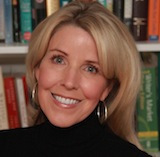
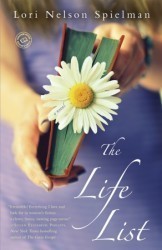
Thrilled to have debut author Lori Nelson Spielman (I'm partial to debut writers) on the blog today to talk about her novel, The Life List. Thank you, thank you, Lori!
CL: How does it feel to be a debut author?LNS: Exhilarating. Surreal. Thrilling. Fraudulent. Yes, most days I feel like I’ve duped everybody. Do all debut authors feel this way? Somehow I’ve been granted membership into an elite club where surely I don’t belong. I’m thrilled, don’t get me wrong. But after years of being on the outside looking in, it’s difficult to actually own the title “author”. Curt Vonnegut once said, “We are what we pretend to be, so we must be careful about what we pretend to be.” For now, I’m going to pretend I’m a writer.
CL: I read that the idea for your novel came from a life list you’d written at age 14. Can you tell us some of the things on your life list?LNS: I wish I could say my list was comprised of noble pursuits and daring adventures. Truth is, most of my wishes were humble and conventional, like having babies and going to college and getting married. Like my protagonist, I wanted a horse and a dog (neither of which I have). And some goals were embarrassingly shallow, like Have lots of clothes. Apparently a nice wardrobe is key to a happy life. Who knew?
CL: Most people think of a bucket list when they see your title. Is there a difference between a life list and a bucket list? LNS: I think of a life list as a blueprint for crafting your life. The goals are broader, farther-reaching and longer-term than those on a bucket list. In the book, Brett’s life list included things like having children and maintaining old friendships. A bucket list, on the other hand, is a list of one-time items that can be checked off in an instant, like a visit to the Grand Canyon or skydiving. But this is just my take on it. People seem to use the phrases interchangeably. And I recently heard about a third type of list, a list of all the things you once thought you wanted, but have decided aren’t worth the effort. The name of this list rhymes with “bucket”.
CL: Do you have a day job? If so, what is it, and does it influence your writing in any way, either by providing inspiration, material for characters or plot, or in any other way? LNS: Like my protagonist, I work as a homebound teacher in an inner city school district. When students have long-term health issues, I gather their schoolwork and teach them in their homes or the hospital. It’s a privilege being invited into someone’s home, where I get to teach one-on-one and develop relationships with the families. It also gives me a glimpse into settings and family situations I wouldn’t normally be privy to, so yes, these experiences definitely helped create scenes that felt authentic to me. Though my characters were fictitious, I’ve had prickly students like Peter, who were out of school for disciplinary reasons, as well as homeless students like Sanquita. I even had one student who wanted me to keep her new baby.
CL: You delve into some cultural issues with your South Side Chicago scenes, using black dialect in some cases. How tricky was that to write? Do you expect to receive any pushback? LNS: It was very tricky. I’m certainly not an expert on cultural issues, but I do feel my job has allowed me a unique perspective. It would be naïve and irresponsible to ignore the fact that social inequality still exists. Poverty rates and homelessness are highest among the black population. Black and Hispanic youth experience the highest rates of teen pregnancy. I feel it would have been more offensive if I’d sugarcoated these issues, created characters who spoke like prep school kids, suggesting that educational disparity doesn’t exist, or worse, portrayed the socioeconomically disadvantaged as a bunch of happy white folks living in nuclear families.
CL: Writing can be a lonely process. Do you have other writer friends, either where you live or online? LNS: One of the biggest perks of becoming a writer has been getting acquainted with other authors, both in person and online. I’ve met some great new friends—friends I imagine will be lifelong. It’s incredible how generous and supportive the writing community is. The same day my book sale was announced, I discovered Claire Cook was following me on Twitter. I’ll never forget it. The author of Must Love Dogs was following me. And Claire isn’t the only gracious author. You, Caroline, are one of the most generous, big-hearted people in the business.
CL: What’s obsessing you now, and why?LNS: Ah, where to begin? The writing (or lack thereof) of my second book, of course. I’m obsessing about the guest blogs I need to write, the Facebook posts and Tweets I should be doing, and, I admit somewhat sheepishly, Goodreads and Amazon reviews. I’m also obsessing about my upcoming book events. What was I thinking? I’m terrified of public speaking. Happier current obsessions include the anticipation of Breaking Bad’s final season, moving to a new house, cracked pepper kettle chips, and Magic Eraser sponges (if you’re rolling your eyes, you haven’t tried them yet).
CL: What question didn’t I ask that I should have? LNS: You're too tactful to ask if I have advice for other "seasoned" would-be authors who are debating whether they should give it a shot, so I’ll tell you. I’m 52 years old, and although I desperately wanted my earlier work published, I couldn’t have chosen a better time to become an author. Along with more life experience, I’ve had a satisfying career, and now have the freedom to move in a new direction. It’s truly exhilarating. I strongly encourage anyone who has a story to tell and the desire to tell it, to give writing a shot, regardless of their age. As Isaac Asimov said, “If my doctor told me I had only six minutes to live, I wouldn't brood. I’d type a little faster.”
Published on June 28, 2013 12:11
Read an astonishing excerpt from David Samuel Levinson's thrilling new novel, Antonia Lively Breaks the Silence
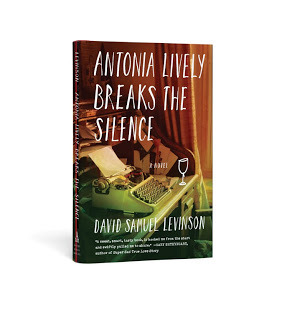
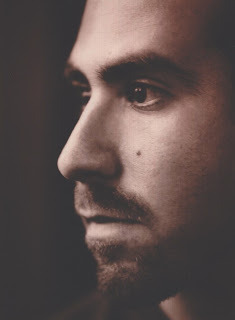
One of the most extravagantly wonderful things about Algonquin Books is that all of the writers seem to really like one another. David Samuel Levinson and I began swapping emails shortly after I read his dazzling new novel, Antonia Lively Breaks the Silence, and we got to meet in person, too, on one unbearably sweltering day at the Algonquin Books party--and we became fast friends. David's also the author of Most of Us Are Here Against Our Will, and his new novel is deservedly racking up the raves. The Denver Post calls it, "A fast-paced page turner," Interview Magazine calls it "an intelligent psychological thriller," and Entertainment Weekly makes it one of it's Must Summer reads, and I, personally, nominate this novel as one of the best of the year. I want everyone to love it as much as I do, and I couldn't be more thrilled to provide an excerpt below. I dare you to read it and not want to read more. Thank you David (and thank you Algonquin Books for providing the excerpt.)
In Medias Res_____We thought ourselves good people who lived good lives. Some of us had lived in the town for generations and had never considered leaving. Many of us, though, had relocated there from the city, in the process learning what it was like to desert the place we loved, longed for, and hated. Winslow wasn’t a big town and couldn’t offer the charms of Manhattan, nothing as remarkable as the rooftops at twilight or Central Park in the rain. While many of us had grown sick of the city’s neon signs and glass towers, many others of us put up photos to remind ourselves daily of what we missed. No one came to Winslow looking for variety: we had one museum, the Finch; a community theater, the Vortex; and only a handful of restaurants, outstanding though they were. Two blocks long, Broad Street consisted of Page Turners, the local bookstore; Mayfair Cinema; Custard’s Last Stand; a barbershop; a launderette; and Einstein’s Video & Arcade. Not far from there — nothing was that far — was Breedlove Hardware; College Breads; Maddox Cafe; and Tint, the bar and restaurant connected to the historic Tweed & Twining Arms hotel. Then there was the heart of the town, Winslow College, giving reason to the place, the lure that had drawn many of us there, to teach and to study. Some who came were either running from combative or cheating spouses, while others were just running. Some ended up staying; others gave it six months or less before the moving trucks arrived and took them away. We saw the trucks and shook our heads. “You haven’t given it enough time,” we said. “One more day!” One more day, though, might become one more year, and those who fled already had grown tired of the things they’d initially come for, the quiet, the cordial hellos in the morning and the good-evenings at night. Those who didn’t last wanted what we didn’t have and could never offer — invisibility. I knew this only because, once, I had been one of them. I, too, had come there from the city but not to escape the barrage of sirens and chattering crowds — things I’d cherished, at least in memory. I came to Winslow out of love; I followed my heart. That was years ago now. For the first year, I hated our house and the town and my heart for luring me there. Yes, my life in the city might have been stressful and chaotic, but it had also been blessed. There was spontaneity, and there were friends and dancing and cocktail parties. I liked parties back then, when I was younger. It was an exciting time. I thought about myself as a writer, filled with promise. Promise, though, has a way of never happening, and much of what followed was painful, though not nearly as painful as this story I’m about to tell. “The action of any good story,” Wyatt used to say, “always begins in the middle.” This story, my story, however, began long before the events in Winslow, before I met Antonia Lively. It began long before Henry Swallow moved to town. Although it’s my story, it began in 1968, set in motion by two brothers in a cabin in the woods. I didn’t know any of this until later, though. I didn’t know any of this until I’d read Antonia’s novel and gradually wove each individual story together — the brothers Linwood and Royal’s, Henry’s, Antonia’s, Wyatt’s, Catherine’s, mine — into this one, ours. Wyatt also used to say there weren’t any fixed rules in writing. I know now, though, that you have to learn the rules first before you can break them. Learn about voice, plot, and point of view. Learn about imagery, setting, and character. Learn all of these things — then let the story dictate how it wants to be told, and never get in the way, because it’s not about you, the writer. It’s about the relationship between the story and the reader. Give the reader a good story, and he’ll forgive just about everything else. spent years reading through Henry’s criticism and Wyatt’s lectures, absorbing and learning these rules of theirs. This story is the result. If I am a writer, it is because I had no other choice. If I tell this story well, if it rings true, it’s because all of our voices that summer and, over time, became one. The reader, though, will be the judge. For now, this story’s as close to the truth as I can get, and that, I’m afraid, will simply have to do.
Copyright 2013 by David Samuel Levinson from Antonia Lively Breaks the Silence, published by Algonquin Books.
Published on June 28, 2013 11:00
June 17, 2013
Win a free copy of Is This Tomorrow and tweet and video chat with me
Every writer is anxious about reviews. I don't know one who isn't--and I probably could keep the Klonopin factories in business with my nerves. So I'm thrilled to announce that Random House's Everydayebooks has compared me to Richard Yates' Revolutionary Road! I'm also a Jewish Book Council BookClub Pick, a San Francisco Chronicle Lit Pick (Editor's Choice), a May Indie Next Pick--and more. You can see the reviews at my website www.carolineleavitt.com. I think I have them memorized.
In other news, Please join me and Chatteworks for a special tweet chat, followed by a video chat, with a book giveaway of IS THIS TOMORROW. It's Tuesday, June 18th, from 8-9 and here are the details!
Please come!
In other news, Please join me and Chatteworks for a special tweet chat, followed by a video chat, with a book giveaway of IS THIS TOMORROW. It's Tuesday, June 18th, from 8-9 and here are the details!
Please come!
Published on June 17, 2013 09:26
June 14, 2013
Julie Sarkissian talks about finding her fabulous Dear Lucy --gasp--given away
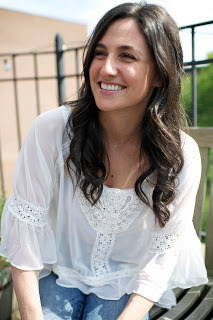
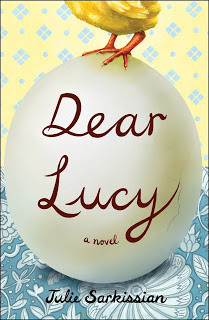
I think the thing I might love as much as Julie Sarkissian's new novel Dear Lucy, is this essay about it. And speaking of her novel, Joyce Carol Oates calls it "boldly lyrical." Ron Rash says it's "startlingly original." And I say this novel, about a farm, a pregnant teenager and a vanished baby, "marks your heart." Julie won the Francis Leon Page Award for creative writing and she's an instructor at the Sackett Street Writer's Workshop. Thank you so much, Julie for writing such a wonderful book--and such a wonderful essay for the blog.
In Good Company By Julie Sarkissian
I buy a good deal of used books. I am lucky enough to live one block from a fantastic thrift store called Housing Works. Actually, I buy more than just books there; I credit Housing Works with providing a majority of my wardrobe and furniture. My finds are a constant source of jealousy among my friends. “You always find the best stuff there,” they tell me. And I do. Especially books. I don’t know how the quality of the books at Housing Works is controlled, but the selection is well curated as the shelves of any indie bookstore, and as a novelist and unabashed book snob that is not praise I give freely. Along with bulking up my classics collection, I have discovered new contemporary favorites at Housing Works; books I had never heard of and now revere; “Mating,” by Normal Rush, “The Book of Ruth,” by Jane Alexander,” “Oranges are not the Only Fruit,” by Jeanette Winterson. Intimate, affordable and an endless source of inspiration, Housing Works is one of my favorite places in all of Brooklyn. Until I saw my own recently published debut novel on its shelves. I was drawn to the cheery orange spine before I realized I was staring at my own book. Dear Lucy, by Julie Sarkissian. I went cold, then broke out in a full body flush. Someone had – gasp – given my book away. Someone had deemed Dear Lucy – my baby, my life’s work, the very essence of my existence – was not even worth re-gifting to a friend. I looked around to make sure nobody had seen the look on my face and immediately pegged me as an author whose book someone did not want to keep. I grabbed my book, rushed to the counter and didn’t wait for my change. Then I got home and had to find a place to put my 51th copy of Dear Lucy. I have stacks of Dear Lucy on chairs, the floor, on my dresser. I have piles of Dear Lucy manuscripts in my basements. What good could come of bringing another copy of Dear Lucy in my tiny apartment? Here the most excitement that book would see would be when it was shuffled from a chair to the floor to make room for someone to sit. Maybe I wasn’t saving the book from being orphaned as much as getting in the way of its being adopted. Like any author, I wanted my book to find readers. But to do that I had to accept the book’s journey into the hearts of appreciative readers would be paved with people that didn’t care for it, that actively disliked it, that would give it away – maybe even throw it away. There was no way I would be able to snatch the book back from people who didn’t like it, but I could hope that it might find its way to people that did. And where better for that to happen than Housing Works, a beloved place where I had discovered so many gems? The next day I took the copy back to Housing Works. The price tag – two dollars – was still on the back. I slipped the book back on the shelf, in between Housekeeping by Marilyn Robinson and Dubliners by James Joyce. Dear Lucy was in good company. Maybe here she could find a good reader as well.
Published on June 14, 2013 08:57



